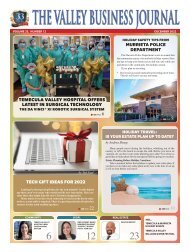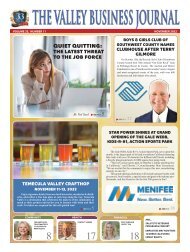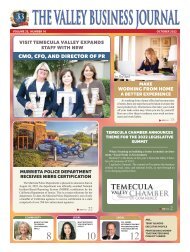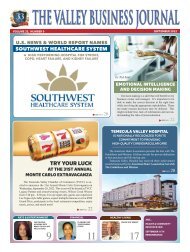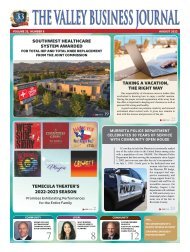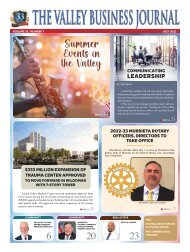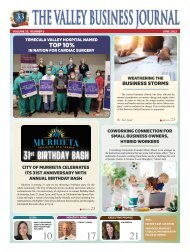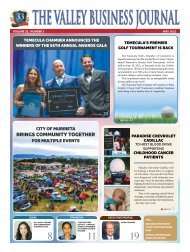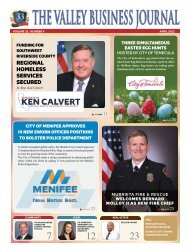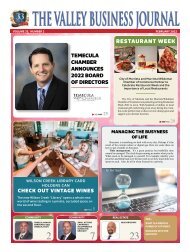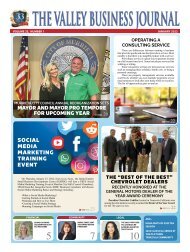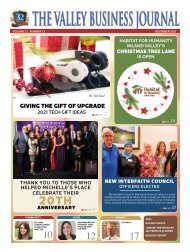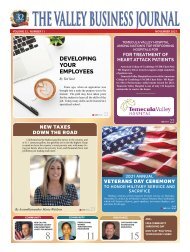VBJ June 2019
Create successful ePaper yourself
Turn your PDF publications into a flip-book with our unique Google optimized e-Paper software.
<strong>June</strong> <strong>2019</strong><br />
THE VALLEY BUSINESS JOURNAL<br />
www.TheValleyBusinessJournal.com<br />
7<br />
A Personal Injury Primer: Following an Auto Collision<br />
by Morton J. Grabel, Esq. and Mark R. Denning, Esq.<br />
10 Things You Might Do After an<br />
Vehicular Collision<br />
The following information while not<br />
complete are the top ten suggestions.<br />
You may want to keep this information<br />
in your wallet or in your car:<br />
1. STOP. Never drive away from the<br />
scene of a collision, even a minor one.<br />
2. PROTECT THE SCENE OF<br />
THE ACCIDENT. You may prevent<br />
further accidents with flares or keeping<br />
your flashers on.<br />
3. CALL THE POLICE. Even if<br />
there are no serious injuries, call the police.<br />
You may need a police report to file<br />
a claim with your insurance company.<br />
The vehicles involved in the accident<br />
should not be moved, unless you are<br />
directed to by the police or they interfere<br />
with traffic.<br />
4. MAKE AN ACCURATE RE-<br />
CORD. When the police arrive, be sure<br />
to tell the investigating officer(s) exactly<br />
what happened. If you do not know<br />
certain facts, say so. Do not speculate<br />
or misstate facts. If you are asked if you<br />
are injured and not sure, say you are not<br />
sure, because pain and injuries from<br />
collisions often develop hours even<br />
days later. Do not feel self-conscious<br />
to request an ambulance. Never ever<br />
argue with a police officer, even if you<br />
believe they are wrong; it will never<br />
help your case.<br />
5. TAKE PICTURES. Try to have<br />
a camera in your vehicle, or a cell phone<br />
equipped with a camera. Take pictures<br />
of the vehicles. If you have visible injuries,<br />
take photos. If you cannot take<br />
pictures at the scene of the collision,<br />
take them as soon as possible. Substantiating<br />
your claim with photos is one of<br />
the best forms of evidence.<br />
6. EXCHANGE INFORMA-<br />
TION. Typically, the investigating<br />
police officer obtains this information.<br />
However, if the police do not arrive timely,<br />
you should try to obtain the names,<br />
addresses and telephone numbers of all<br />
persons involved in the accident, drivers<br />
and passengers alike. You should also<br />
try to obtain information about the other<br />
party’s insurance by asking to see the<br />
insurance cards. If there are witnesses,<br />
try to get information from them so they<br />
can be contacted in the future. If police<br />
do arrive, the investigating officer will<br />
provide all drivers with a police report<br />
number to obtain the police report.<br />
7. REPORT THE ACCIDENT.<br />
Notify your insurance company as soon<br />
as possible. Many policies require immediate<br />
reporting and full cooperation.<br />
Find out if you have medical benefits<br />
as part of your insurance coverage also<br />
known as “med-pay”.<br />
8. SEEK MEDICAL ATTEN-<br />
TION. Often injuries are not immediately<br />
apparent. Many of our clients<br />
report feeling the most pain a day or<br />
two after the collision. Therefore, you<br />
should seek medical attention or see<br />
your family physician. Even in accidents<br />
involving minor impact, you can<br />
sustain a serious and permanent injury<br />
to your spine. If you lost consciousness<br />
or were dazed even for a short period of<br />
time following the collision, you may<br />
have suffered a concussion or closed<br />
head injury.<br />
9. KEEP AN ORGANIZED FILE.<br />
Keep all your accident-related documents<br />
and information together; including<br />
claim number, claim adjuster’s<br />
name, names/phone numbers of all<br />
contacts, receipts for rental car and<br />
all expenses incurred as a result of the<br />
accident.<br />
10. PROTECT YOUR RIGHTS.<br />
Perhaps the most important thing you<br />
should do after an accident is to consult<br />
an attorney. An attorney can protect your<br />
rights and make sure valuable evidence<br />
is not destroyed. Often, insurance companies<br />
want to take statements immediately<br />
after an accident. It is important<br />
that you receive legal advice before<br />
providing any statements. An attorney<br />
can advise you on issues including getting<br />
medical treatment on a lien and/or<br />
if you have med-pay.<br />
This office represents innocent victims<br />
that were involved in vehicular collisions,<br />
representing both the driver and<br />
passengers. This office has recovered<br />
millions of dollars for our clients in the<br />
Inland Empire, San Diego County, Los<br />
Angeles County and Orange County.<br />
Please note by reading the information<br />
above & herein, no attorney-client<br />
relationship has been created. The<br />
information provided herein is not to<br />
be relied upon as legal advice for your<br />
specific legal needs. Should you have<br />
legal questions contact<br />
The Law Offices Morton J. Grabel in<br />
Temecula at (951) 695- 7700. Mort,<br />
originally from Philadelphia PA, attended<br />
an ABA Law School, has an MBA,<br />
a Real Estate Broker’s License, a CA<br />
Nursing Home Administrator’s License<br />
and is a member in good standing of<br />
local Chambers of Commerce.



